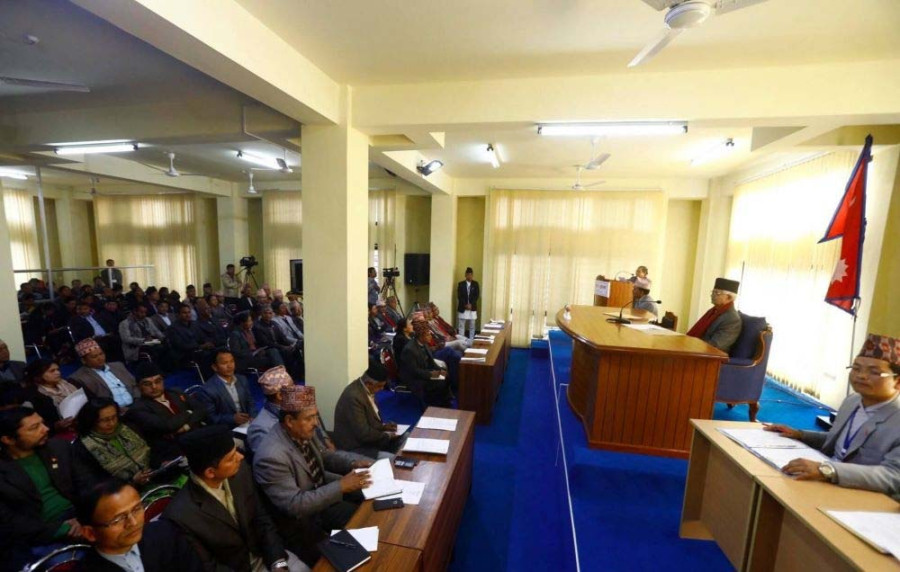National
Provincial leaders balk at ruling party’s directive to name Province 3 ‘Bagmati’
The Nepal Communist Party’s diktat concerning the name and capital of the province has been criticised by provincial assembly members for infringing on the spirit of federalism.
Tika R Pradhan
Province 3 Assembly members from the ruling Nepal Communist Party have warned the party leadership against any attempts to impose decisions on them in clear violation of the spirit of federalism.
The assembly members, particularly from the districts Dolakha, Kavre, Sindhupalchok, Dhading, Kathmandu, Bhaktapur and Lalitpur have taken particular issue with the party’s December 29 order to name Province 3 ‘Bagmati’ and continue with Hetauda as its capital. Hetauda was designated the temporary capital in January 2018.
Assembly members from Makawanpur and Chitwan, however, are in favour of endorsing the party high command’s directive, leading to a sharp division in the Province 3 Parliamentary Party and party committees.
According to constitutional provisions, the names and capitals of the provinces need to be endorsed by a two-thirds majority of the assembly.
Though the Nepal Communist Party (NCP) commands a two-thirds majority in the 110-member Province 3 Assembly with 80 seats, the infighting could make it difficult to endorse the suggested name and capital.
During a meeting of the Parliamentary Party held on January 3-5, a majority of the assembly members refused to abide by the NCP secretariat’s decision, saying that it infringes upon their sovereign right to choose the name and capital of the province.
Provincial leaders, including Province 3 committee in-charge Asta Laxmi Shakya and lawmakers Narayan Dahal, Ananda Pokhrel, Rajendra Pandey and Shalikram Jamarkattel, met with the top leadership on Tuesday to communicate the reasons behind the delay in the provincial assembly meet.
“We briefed the top leadership on the opinions of 64 assembly members who spoke during the three-day meeting of the Parliamentary Party,” said Yubaraj Dulal, the minister for social development. “But the leadership has told us that the decision of the party secretariat was made unanimously. Now we will try to convince all assembly members.”
Experts on constitutional matters and federal affairs say that the hullabaloo in the ruling party over the leadership’s decision on the name and capital of a province showcases an even bigger problem.
“This shows the federal system is failing in Nepal,” said Bhimarjun Acharya, an expert on constitutional matters. “It’s sad that parties are intervening in issues that are purely the prerogative of provincial assembly. But it was inevitable.”
Acharya has long maintained a critical stance on the decision to adopt federalism, saying the system is not viable, given Nepal’s economic strength and socio-cultural diversity.
But when the constitution adopted the federal system, it was a point of no return and the parties should now work for its implementation, according to Acharya.
“The ongoing intervention of the ruling party has killed the spirit of federalism as envisioned by the constitution,” Acharya told the Post.
With assembly members raising a serious objection, there’s uncertainty over the vote to decide the name and the capital. Immediately after the secretariat’s decision on December 29, Province 3 Chief Minister Dormani Poudel had told the Post that the decision would be made through a vote “within a week”.
Ratna Dhakal, a provincial assembly member critical of the secretariat’s decision, said a group of assembly members would register a proposal to make Kavre the capital.
“We don’t know how things will evolve,” Dhakal told the Post. “If the party had not made the decision, Kavre would have been an easy choice.”
Only three of the seven provinces have so far decided on their names and capitals.
Except for Province 2, where the Samajbadi Party Nepal and the Rastriya Janata Party Nepal together command a majority, the three other provinces without a name and permanent capital were looking up to the leadership in Kathmandu for solutions. The Nepal Communist Party leads all provincial governments except in Province 2.
“The names and capitals should have been finalised long ago,” said Khimlal Devkota, an expert on federal affairs who led the Province 3 Planning Commission until July last year. “Party leaders from the provinces are showing their dual character. On the one hand, they are complaining about not getting resources, authority and power and on the other, they are asking Kathmandu to take decisions on their behalf.”
According to Devkota, Nepal Communist Party leaders in Kathmandu have set a bad precedent by directing provincial leaders.
“When I was in the province, I was surprised to learn how provinces used to seek suggestions and nods from central leaders to even carry out their daily work,” Devkota told the Post.
According to Devkota, Nepal’s political parties have never learned from past mistakes.
“Conflict over the capitals and the number of provinces was the major reason for the dissolution of the first constituent assembly,” said Devkota. “It was a mistake to not write in the constitution itself that the names and capitals must be finalised within a year [of the promulgation of the constitution]. Now it is going to be very difficult because there are so many elements fishing in troubled waters.”




 17.12°C Kathmandu
17.12°C Kathmandu














